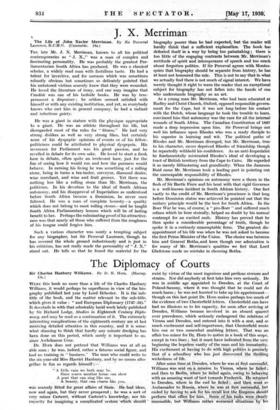J. X. Merriman
THE, late Mr. J. X. Merriman, known to all his political contemporaries as " J. X.," was a man of complex and fascinating personality. He was probably the greatest Par- liamentarian South Africa has produced. He was a classical scholar, a widely read man with fastidious taste. He had a talent for invective, and for sarcasm which was sometimes robustly obvious but sometimes so delicately pointed that his untutored victims scarcely knew that they were wounded. He loved the literature of irony, and one may imagine that Candide was one of his bedside books. He was by tem- perament a dispraiser ; he seldom seemed satisfied with himself or with any existing institution, and yet, as everybody knows who met him in general company, he had a radiant and infectious gaiety.
He was a giant in stature with the physique appropriate to a giant. He was an athlete throughout his life, but disregarded most of the rules for " fitness." He had very strong dislikes as well as very strong likes, but certainly none of his dyspeptic opinions of events or of his fellow; politicians could be attributed to physical dyspepsia. His reverence for Parliament was his great passion, and he revelled in debate for its own sake. He loved to start a fresh hare in debate, often quite an irrelevant hare, just for the fun of seeing how it would run and how the pursuers would behave. In earning his living he was something of a rolling stone, being in turns a tea-taster, surveyor, diamond dealer, wine merchant, and wine and fruit grower. Yet there was nothing less like a rolling stone than Mr. Merriman, the politician. In his devotion to the ideal of South African autonomy, and his disapproval of Imperialism as understood before South Africa became a Dominion, he never once faltered. He was a man of complete honesty—a quality which does not belong to most rolling stones—and he taught South Africa Parliamentary lessons which will be of lasting benefit to her. Perhaps the culminating proof of his attractive- ness was that nearly all those who suffered from the roughness of his tongue could forgive him. _
Such a various character was surely a tempting subject for any biographer, but Sir Perceval Laurence, though he has covered the whole ground industriously and is just in his criticism, has not really made the personality of " J. X." stand out. He tells us that he found the material for the
biography poorer than he had expected,' but the reader will hardly think that a sufficient explanation. The book has defeated itself in a way by being too painstaking ; there is too little of the engaging contrasts between Mr. Merriman's rectitude of spirit and intemperance of speech and too much about forgotten politics. If Sir Perceval agrees with Montes- quieu that biography should be separate from history, he has at least not honoured the rule. This is not to say that in what we actually find there is not much of signal interest. We have merely thought it right to warn the reader that an exceptional subject for biography has not fallen into the hands of one who understands biography as an art.
As' a young man Mr. Merriman, who had been educated at Hadley and Christ Church, Oxford, opposed responsible govern- ment for the Cape, but it was not long' before' his contact with the Dutch, whose language he took the trouble to learn, convinced him that autonomy was the cure for all the internal wounds of South Africa: The Canadian Constitution of 1867 made a deep impression upon him. Sir Perceval brings Out well his influence upon Rhodes who was a ready disciple to his superior in learning and wit. The political paths of Rhodes and Mr. Merriman diverged, but Mr. Merriman, -true to his character, never deprived Rhodes- of friendship though he repeatedly withheld his confidence. As an anti-Imperialist he fundainentally mistrusted Rhodes's ideal of developing a tract of British territory from the Cape to Cairo. He regarded it as merely filibustering and grandiosity. When the Jameson Raid came Mr. Merriman took a leading part in pointing out the unescapable responsibility of Rhodes.
Mr. Merriman's opinions on autonomy were a thorn in the flesh of Sir Bartle 'Fiere and his bout with that rigid Governor is a Well-known incident in South African history. One fact vastly to the credit of Mr. Merriman's -prescience is that long before Dominion status was achieved he pointed out that the unitary principle would be the best for South Africa.- In the Boer War he was; of Course,' a " pro-Boer " and suffered much odium which he bore stoically, helped no doubt by his normal contempt for an excited mob. History has proved that he then spoke a considerable percentage of truth, though he spoke it in a curiously unacceptable form. The greatest dis- appointment of his life was when he was not asked to become the first Prime Minister of the Union. The choice was between him and General Botha, and keen though our admiration is for many of Mr. Merriman's qualities we feel that Lord Gladstone made no mistake in choosing Botha.














































 Previous page
Previous page